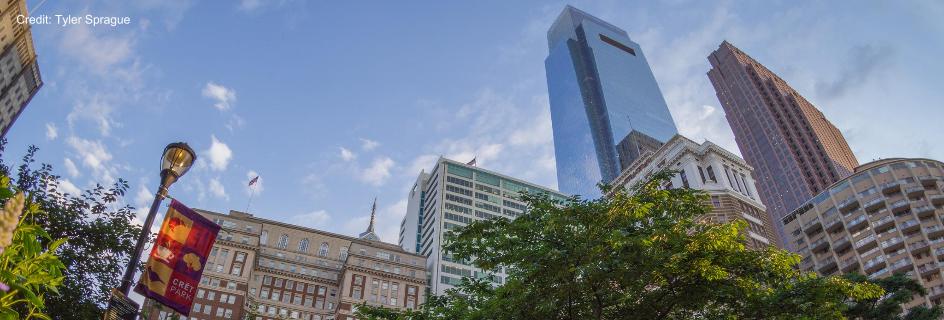- About GPA
- Global Events
- GLOBAL NEWS FROM PHL
- Global Directory
- World Heritage City
- Sustainable Development Goals (SDGs)
- Global Philadelphia Role on Sustainable Development Goals
- Completed Sustainable Development Goals
- SDG#1: No Poverty
- SDG #2: Zero Hunger
- SDG#3: Good Health & Well-Being
- SDG#4: Quality Education
- SDG#5: Gender Equality
- SDG#6: Clean Water & Sanitation
- SDG#7: Affordable and Clean Energy
- SDG #8: Decent Work and Economic Growth
- SDG #9: Industry, Innovation, and Infrastructure
- SDG#10: Reduced Inequalities
- SDG#11: Sustainable Cities and Communities
- SDG#16: Peace, Justice and Strong Institutions
- SDG#17: Partnerships for the Goals
- Press
Home ›
Everybody Gets a Hit! A Brief History of Philadelphia Baseball and its Impact on the City
Posted on July 16, 2018

Article written by Kyle Purchase on behalf of Global Philadelphia Association
What do Connie Mack, Dallas Green, and Charlie Manuel all have in common? Each was a former manager of a Philadelphia baseball team and each has led their teams to become World Series championships!
Not only is the sport of baseball known as “America’s pastime," but it is also a thriving part of Philadelphia's heritage. Throughout history, the city of Philadelphia's baseball teams – Philadelphia Stars, Athletics, Phillies – have produced numerous members of the National Baseball Hall of Fame, including Jud Wilson, Satchel Paige, Eddie Collins, Mickey Cochrane, Ty Cobb, Grover Cleveland Alexander, Robin Roberts, Mike Schmidt, Steve Carlton, and Jim Thome.
During their tenure in Philadelphia, the Athletics, a professional baseball team that played in the second half of the 19th century, won five World Series Championships (1910, 1911, 1913, 1929, and 1930). The Philadelphia Stars, a Negro league baseball team, defeated the Chicago American Giants in an exciting playoff series, for the Negro National League pennant in 1934. More recently, the Phillies also have titles of their own with two wins (1980 and 2008).
Over the years, these teams played in numerous stadiums located throughout Philadelphia, many of which no longer exist today. Fields and stadiums such as Columbia Park, Baker Bowl, Shibe Park (also known as Connie Mack Stadium), and Veterans Stadium have all been converted to either parking lots or land for homes: http://www.phillyvoice.com/then-and-now-a-historic-look-at-philadelphias-ballparks/
Along with the championship games and victories, come large community gatherings and celebratory parades down Broad Street, bringing the whole city together in pride. In one example, Philly Voice shared the following photo (source: Library of Congress, Prints and Photographs Division) of baseball fans sitting on the roofs of rowhomes in North Philadelphia on October 9, 1914, to watch the Philadelphia Athletics and Boston Braves play Game 1 of the 1914 World Series.

In more recent times, John Kopp of Philly Voice notes that the 2008 parade after the Phillies won the World Championship was one of the greatest moments of Philadelphia uniting as a city:
“The Phillies snapped the so-called Curse of Billy Penn, in which Philadelphia had failed to win a sports championship since constructing skyscrapers higher than the William Penn statue atop City Hall. SEPTA was so unprepared for the multitudes of fans flocking to Center City that, seven years later, it revamped its Regional Rail service to handle the masses expected at the upcoming papal visit!”
More on the “Curse of Billy Penn” – the alleged curse has had an effect on all sports teams in Philadelphia, not just baseball. The Phillies first broke the curse in 2008, when they won the World Series, a year and four months after a statuette of the William Penn figure atop City Hall was affixed to the final beam during the June 2007 topping-off of the Comcast Center.
The curse seemed to re-emerge its bad karma over the city when the Phillies lost the 2009 World Series and the Philadelphia Flyers lost the NHL Stanley Cup Finals in 2010.
On November 27, 2017, the day of the "topping out" of the new tallest building in Philadelphia the Comcast Technology Center, ironworkers once again placed a new William Penn figurine atop the building's highest beam in hopes to ward off the curse and, on February 4, 2018, the Philadelphia Eagles defeated the New England Patriots in Super Bowl LII to win their first Super Bowl in team history, and first championship since the 1960 NFL Championship.
Another memorable moment in Philadelphia's baseball history was the singing of Frank Sinatra's classic song, "High Hopes," sung by Harry Kalas, Hall of Fame Phillies broadcaster. Kalas first sang this song to the crowd in 1993 after the Phillies won the NL East division title. He sang the song many more times – particularly after the Phillies won the championship in 2008 – and, since Kalas' passing in 2009, it remains a tradition today in Citizens Bank Park to play a recording of Kalas singing, played during the seventh inning stretch.
The comradery surrounding Philadelphia sports teams create a unique culture in the city. In the examples described above, it shows how much playing (and hopefully continuing to win!) championship games can bring our city together, increasing morale, tourism, and even economic development supporting our local economy.
The game of baseball will forever be etched into Philadelphia history and will remain for all generations of Philadelphians – and for all baseball fans – to enjoy!







